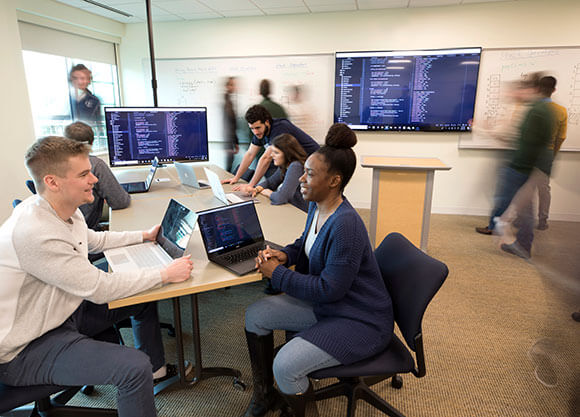
Quinnipiac debuts new name for School of Computing and Engineering
New name represents school’s commitment to be a leader of the rapidly evolving marketplace
November 09, 2021

November 09, 2021

“This change reflects the important work that the faculty and administrators within our school are doing to prepare students for the opportunities of the changing computing and engineering landscape,” said Lynn Byers, interim dean of the School of Computing and Engineering and professor of mechanical engineering. “This recognizes the important work in our school as well the increasing significance of a variety of computing fields throughout the industry. We are excited about the possibilities that the new name represents.”
The programs within the school include computer science and software engineering, as well as civil engineering, industrial engineering and mechanical engineering. The school also offers a master’s degree in cyber security, and a variety of opportunities for accelerated and dual-degree programs where Quinnipiac students can earn a combined bachelor’s and master’s degree to enter the workforce sooner.
“The new name reflects the richness of computing programs already in place in the school and across the university, and will increase the visibility and national distinction of computing at Quinnipiac for both our faculty and students,” said Provost Debra Liebowitz. “It highlights the university’s investments in the development of an interdisciplinary computing ecosystem that advances students’ preparedness for evolving industry needs, and expands curricular and co-curricular opportunities for all students.”
Quinnipiac already has several offerings of computing-related programs across the College of Arts and Sciences, and schools of business, communications, and computing and engineering, the university provost noted.
“Those programs, including business analytics, data science, computer information systems, game design and development, and interactive media and design that are housed within different schools, will be more intentionally connected with the School of Computing and Engineering,” Liebowitz said.
The university’s commitment is much more than a new name.
“We’re upgrading classrooms and laboratory spaces used by computing students across the university,” Liebowitz said. “We’ve built a new eSports competition and practice space, and we’re adding a new computing collaborative classroom in the School of Computing and Engineering to facilitate students’ work on projects. These types of interactive learning environments help prepare our students to be leaders in computing fields that are the foundation across many jobs in today’s and tomorrow’s marketplace.”
Janine Jay ’18, an alumna of the software engineering program, said the new name is indicative of where the industry is headed and the university’s commitment to student preparation in evolving fields.
“Quinnipiac went beyond teaching the foundations of computing and gave us an environment that mimicked working in the industry,” said Jay, who also earned a minor in mathematics. “You could tell from day one that the professors all wanted to see you succeed. They would help us look and prepare for jobs, and they would show us industry-best practices so that we were already a step ahead when we graduated. The curriculum that the Quinnipiac professors created wasn’t built from the ground up, but reverse engineered from a post-graduation job.”
Jay, who is a software engineer at Liberty Mutual Insurance, looks to the new name and on-going commitment of the university to computing with optimism.
“The school’s new name reflects the relevance that computing has on our world,” she said. “Every part of our lives is touched by software, and it’s important to put that front and center. This change showcases the amazing program that Quinnipiac offers to a larger audience.”
The university’s commitment to computing across the university is growing, Liebowitz added.
“This emphasis on computing comes at a time when computing and computer technology touch nearly every aspect of our daily lives — from the cars we drive, to the movies we watch, to the ways we communicate and collaborate with each other, to the process through which every product is produced and every service is delivered,” she said. “Whether you want to be a scientist, tackle corporate cybersecurity challenges, or just understand how non-fungible tokens and cryptocurrencies are changing the worlds of art, music and video, studying computing at Quinnipiac will provide that valuable knowledge.”
Quinnipiac Today is your source for what's happening throughout #BobcatNation. Sign up for our weekly email newsletter to be among the first to know about news, events and members of our Bobcat family who are making a positive difference in our world.
Sign Up Now